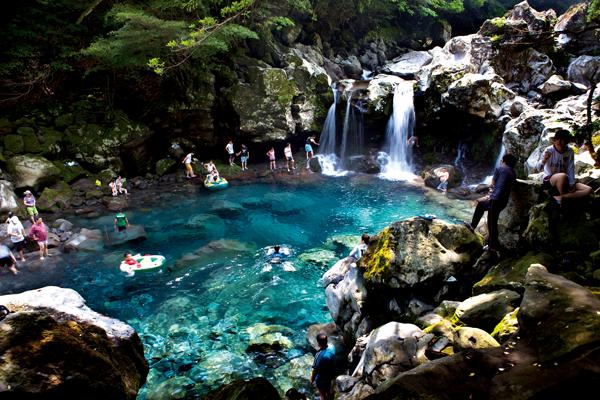| |
 |
|
| ▲ Donnaeko Waterfall, one of the few above ground bodies of fresh water on Jeju. Photo courtesy Jeju Tourism Organization |
Professor Jin Tak Choi of Incheon National University says that Jeju needs to start using cutting-edge ICT to ensure its clean water supply can cope with the recent population increase and tourism boom.
Speaking to The Jeju Weekly at the 24th Water Management Symposium on Feb 26, Choi said that that climate change and shrinking global water supplies were making it crucial that city planners everywhere look to smart solutions to tackle water shortages.
Choi, who is also president of the Society for a Smart Water Grid, said that as Jeju relies on “rain, snow and groundwater” to supply its 640,000 residents and over 12 million tourists, it “needs to start managing that water using ICT.”
Water was traditionally scarce on Jeju, with the island having few bodies of fresh water thanks to the island’s porous volcanic bedrock.
Rather than gathering in rivers and lakes, precipitation on Jeju mostly seeps into deep confined aquifers. Jeju villages formed around natural springs where “multong” stored freshwater.
Thanks to modern drilling technology, we are now able to tap the huge underground water pocket into which Jeju’s precipitation descends, and upon which water company Samdasoo relies.
Choi explains that it is crucial that the water management system is fitted with ICT to ensure sustainable use of this water resource.
| |
 |
|
| ▲ Professor Jin Tak Choi of Incheon National University believes ICT can increase the efficiency of Jeju’s water use. Photo by Eric Sweet |
Smart Water Grids use two-way digital technology to control consumption, promoting water conservation, reduced costs and reliability of water supply.
Such grids use an intelligent monitoring system to keep track of all water flowing through the system, and they encourage consumers to use appliances such as sprinklers or boilers at times when water use is least expensive.
Until Jeju has such a smart system, it is difficult to quantify water resources and usage in real-time.
Jeju is taking heed of the warnings, and Jeju Provincial Water Resource Management Headquarters will establish real-time telemonitoring at 241 water management sites this year using ‘Internet of Things’ technology.
Once in place, water charging can be done “by the drop,” increasing awareness of the need for water conservation.
Under the current system, checks are akin to getting out of your car and manually checking your gas tank every time you want to make a measurement, making real-time and long-term predictions difficult.
Choi says that an ICT Smart Water Grid could give us a digital dashboard to make more informed decisions about how to use our water responsibly.
Not knowing this information can have real consequences. As recently as 20 years ago, China had an estimated 50,000 rivers throughout the country but, according to a 2012 census, more than 28,000 of them have disappeared.
According to a National Geographic Study, eight of the largest rivers on earth no longer reach the ocean and more than half of the Earth’s 37 largest aquifers are being depleted according to gravitational data from NASA’s GRACE satellite system.
For Korea, as for many of these hard hit areas, knowing how much water we have is necessary for survival.
Thankfully, the country is already starting to adopt advanced technologies in its cities including Goryeong and Paju, which have both recently begun testing a Smart Water Grid. Five other cities are set to follow, with Jeju possibly among them.
One of the biggest challenges in developing this technology on Jeju is money.
Although there is a strong interest in ICT, money has to be spent on renovating old pipes and the antiquated water management infrastructure to create a Smart Water Grid.
Funding would have to be found by local government, with support from the Korea Water Resources Corporation (K-water).
The whole system could take up to five years to set up for the island as a whole, says Choi, who stresses that despite the upfront cost, the long-term benefits are huge.
Currently, used water is discharged mostly untreated after use by industry and agriculture.
“In Jeju, they throw out everything ... so if we can save that water, it will be beneficial to Jeju,” says Choi.
As water scarcity and demand continues to increase, innovative solutions like Smart Water Grids will become a growing priority for residents and tourists alike.
With Jeju’s population growing at a rate of around a thousand per month, and with 20 million tourists projected by 2025, it is crucial the island future-proofs its water infrastructure in line with its innovative new and renewable energy infrastructure.
Eric Sweet
nextdesignworld@gmail.com
|





















